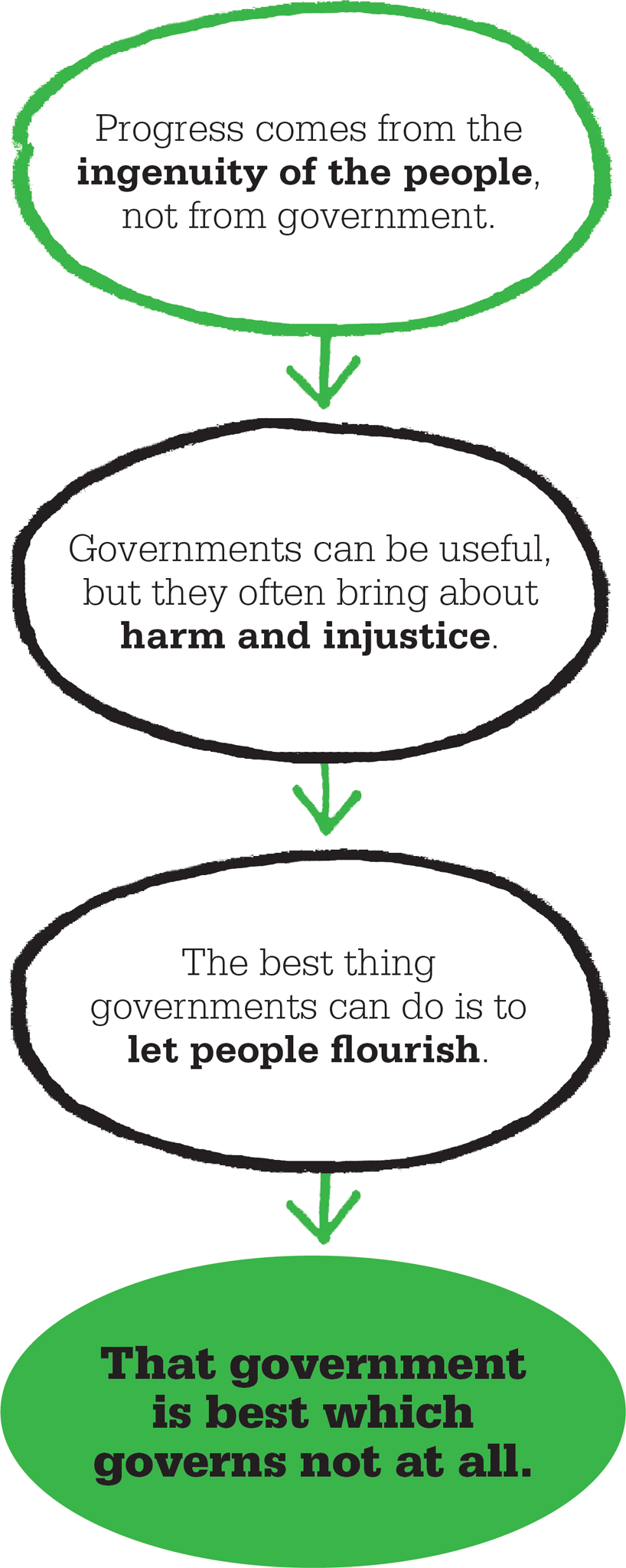
IN CONTEXT
Individualism
Direct action
380 BCE In Plato’s dialogue the Crito, Socrates refuses the chance to escape execution, arguing that as a citizen of Athens he has a duty to obey its laws.
1819 English poet Percy Bysshe Shelley writes Masque of Anarchy, which imagines the potential of non-violent resistance to injustice.
Early 20th century Suffragettes break the law in the US to protest at the lack of voting rights for women.
1920s Mahatma Gandhi applies his version of civil disobedience, Satyagraha, to the cause of Indian independence.
In his essay Civil Disobedience, published in 1849, American writer Henry David Thoreau argued that an individual should do what his moral conscience, not the law, tells him is right. If he does not do this, governments will quickly become the agents of injustice. Thoreau saw evidence for his view in the government of the United States before the Civil War, and in particular in the existence of slavery. The essay was written shortly after the end of the Mexican–American War (1846–1848), in which the US had taken territory from Mexico. Thoreau had vehemently opposed the war, which he saw as an attempt to extend slavery into new territories.

For Thoreau, the existence of slavery in the US rendered the government illegitimate. He said that he could not recognize any government that was also the government of slaves. Thoreau held that the state easily becomes the vehicle for this kind of injustice when its citizens passively collude with it. He likened men with dulled moral senses to pieces of wood or stones from which the machinery of oppression can be fashioned. For him, it was not just the slave owners who were morally culpable for slavery. Citizens of the state of Massachusetts might seem to have had little to do with the slavery of the South, but by acquiescing to a government that legitimized it, they allowed it to endure.
The logical conclusion of Thoreau’s thinking is summed up by his statement that the best government is that which governs not at all. According to Thoreau, progress in America came not from government but from the ingenuity of the people, so the best thing government could do was to get out of people’s way and let them flourish.
Thoreau said that a disaffected individual must do more than just register disapproval at election time: the ballot box is part of the state, but the individual’s moral conscience stands above and outside such institutions. “Cast your whole vote, not a strip of paper merely, but your whole influence,” he urged. An individual’s sense of natural justice may call for direct actions independent of the machinery of government or the views of the majority. For Thoreau, these actions were: the withdrawal of recognition of the state; non-cooperation with its officials; or the withholding of taxes. Thoreau himself was briefly jailed in 1846 for refusing to pay the Massachusetts poll tax because of his opposition to slavery.
Thoreau influenced later thinkers and activists, such as Martin Luther King, who cited him as an inspiration. In the 1960s, as the civil rights struggle gathered momentum in the country, Thoreau’s ideas gained a renewed relevance for activists engaged in acts of civil disobedience.

The bondage of slaves such as these in South Carolina was not only a crime by the slave owners, according to Thoreau. All citizens who allowed the practice were morally implicated.
HENRY DAVID THOREAU

Born in 1817 in the town of Concord, Massachusetts, Henry David Thoreau was the son of a pencil maker. He attended Harvard University, where he studied rhetoric, classics, philosophy, and science. He ran a school with his brother John until John’s death in 1842.
At the age of 28, Thoreau built a cabin at Walden Pond on land owned by the writer Ralph Waldo Emerson, and lived there for two years. His book Walden, an investigation of simple living and self-sufficiency, extolled the benefits of solitude and man’s direct experience of nature. Thoreau joined Emerson and the “transcendentalists”—who believed in the basic goodness of the individual. In 1862, he died of tuberculosis. His last words—said to have been “Moose, Indian”—perhaps exemplified his love for the natural life.
Key works
1849 Resistance to Civil Government, or Civil Disobedience
1854 Walden
1863 Life without Principle
See also: Peter Kropotkin • Emmeline Pankhurst • Mahatma Gandhi • Martin Luther King • Robert Nozick
